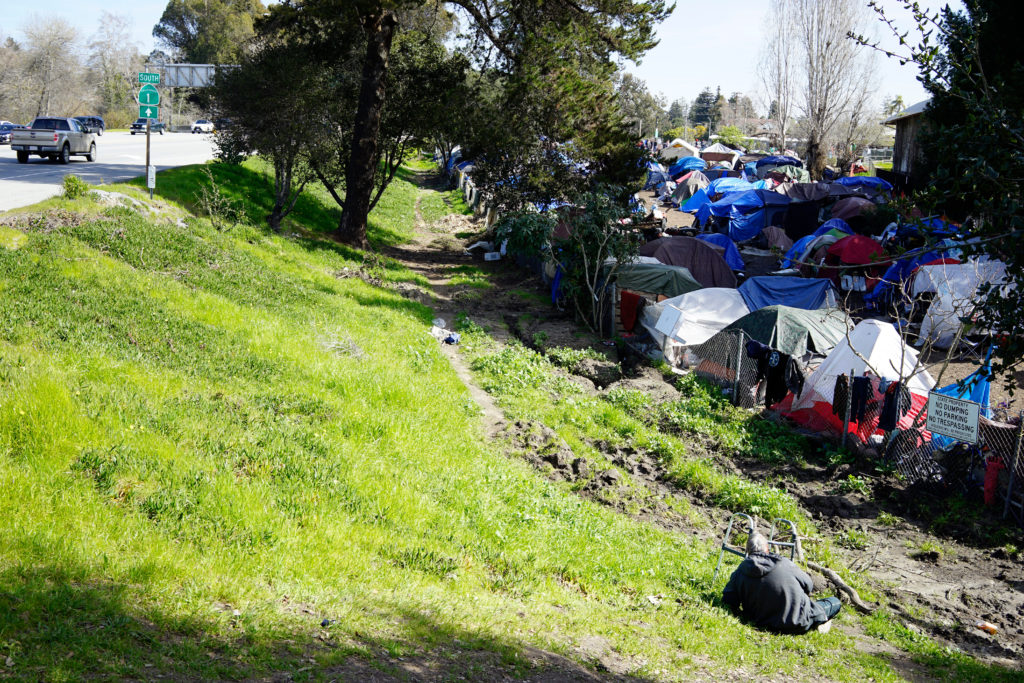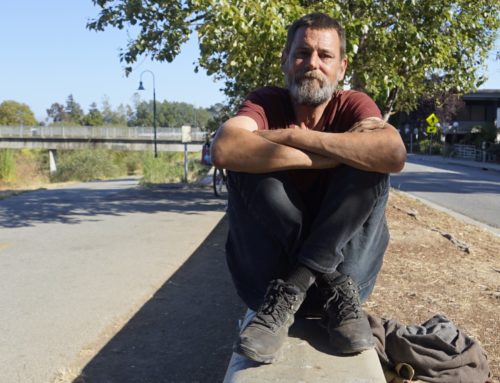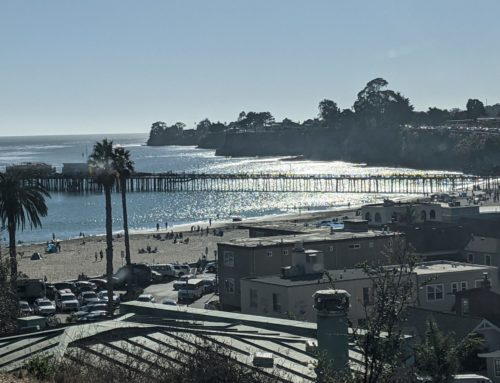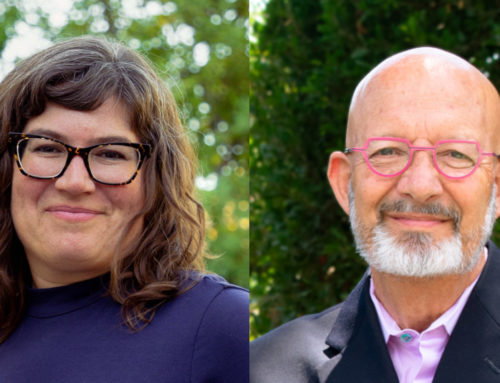On Tuesday, in an open letter to the community, Santa Cruz City Manager Martin Bernal writes that the city is no longer pursuing a “safe sleeping” homeless camp. The plan for a 50-bed shelter next to Depot Park is most likely dead. What does this mean for the closure of the Ross Camp by Highway 1 and River Street? We talk to city spokeswoman Eileen Cross, City Attorney Tony Condotti and Rayne Marr, the county’s homeless services coordinator.
TRANSCRIPT
Kara Meyberg Guzman: Welcome to Santa Cruz Local, where we watch our public institutions and hold power to account. I’m Kara Meyberg Guzman.
For months, the City of Santa Cruz has been grappling with what to do about the Ross Camp, a haphazard unsanctioned homeless camp at Highway 1 and River Street. City and county leaders say it has become a public health hazard. The city first said it was going to close the camp by March 15, which was then delayed to April 17. Now it seems that the camp’s closure may be up in the air.
Here’s what you need to know about the city’s plans for its homeless camps.
[MUSIC FADE OUT]
First off, the city’s plan for a new camp in a Washington Street parking lot is most likely dead. The plan would have created a place for homeless people to sleep next to Depot Park. The plan, which the city called a “safe sleeping and storage site” would have allowed people to store their belongings there, but would have forced campers to leave each morning.
At last week’s Santa Cruz City Council meeting, dozens of Depot Park neighbors turned out in opposition. The council voted to reconsider the plan at the next meeting on April 9. Councilmember Cynthia Mathews, who was a deciding vote to approve the Washington Street camp, said she no longer supported the plan.
On Tuesday, in an open letter to the community, City Manager Martin Bernal said that the city is no longer pursuing a safe sleeping and storage site. When the city council rejects the Washington Street camp plan, as it is expected to on Tuesday, the city will not pursue another site for a safe sleeping camp.
I talked with Eileen Cross, the city’s community relations specialist, on Tuesday afternoon. She said, despite the rumors, the Jessie Street Marsh is not being considered as an alternative site.
EILEEN CROSS: We have not been given any direction to provide any alternative site, so that’s about all I know. At this point, we’re not pursuing anything. There’s nothing currently under consideration.
KMG: In a minute, we’ll talk about what this development means for the closure of the Ross Camp. We’ll meet after one short break.
[MUSIC IN BACKGROUND]
KMG: Santa Cruz Local is a watchdog news startup co-founded by Stephen Baxter and me, Kara Meyberg Guzman. Our mission is to produce fair and accurate journalism that holds power to account.
We recently published a special report that details data on Santa Cruz’s rental market. As the city enters a year-long process to devise policy for tenant protections, one thing has been sorely lacking from the debate: real numbers from neutral sources about the city’s rental market. We filed several public records requests to get data from the city, the county and the court system. We also got access to the real estate database, MLS. We share with you what we find.
You can visit our website, santacruzlocal.org, to check out the report. And we’d like to hear your thoughts on it. Email us at [email protected] or tweet to us @theSCLocal.
[MUSIC FADE OUT]
KMG: OK. So we know that the Washington Street camp, which was supposed to provide 50 shelter beds, is probably not going to open as planned on April 17.
Remember that that the Washington Street camp was part of the city’s plan to close the Ross Camp. The city had the goal of creating 110 new shelter beds by the time it closed the Ross Camp.
The city’s second part of the plan, a camp at 1220 River Street, is still scheduled to open April 17. That camp will provide 60 beds, and will be professionally managed by the Salvation Army.
Let’s talk now with City Attorney Tony Condotti, about what that means for the planned closure of the Ross Camp.
I spoke to him by phone on Tuesday. I asked him to break down Martin vs. Boise, a federal court ruling from last year that said that cities can’t outlaw sleeping in public if people have nowhere else to go.
CONDOTTI: The Martin vs. Boise decision stands for the notion that the city can’t enforce an ordinance against camping on public property with respect to a person who happens to be homeless if there is not another available alternative location for that person to go and sleep. And so, it does not stand for the notion that the city has a legal obligation to furnish a shelter for all homeless people in the city. Rather, it restricts the city’s ability to restrict its camping ordinance when an alternative location isn’t available. If there is an alternative place for the current occupants of the Ross Camp to go, then the city could move forward with the closure of that camp. But it couldn’t simply move in without providing some assistance to the occupants in finding another location.
KMG: So what does that mean for the closure of the Ross Camp? First off, the number of people in the Ross Camp is hard to pin down. It fluctuates each day and night. Last we checked, the city was trying to do a census at different times to get an accurate number.

If the Ross Camp has more than 60 people, then they couldn’t all fit at 1220 River Street. There are three other shelters open in the city right now, and usually there are open beds to be found there.
For example, last week, there were about 12 beds open each night at the Laurel Street shelter, according to Rayne Marr, the county’s homeless services coordinator.
So, back to the Ross Camp: For the city to enforce the Ross Camp’s closure, there would have to be enough shelter beds elsewhere in the city. If existing shelters aren’t enough, Condotti said one idea might be hotel vouchers.
If you would like to share your ideas with the city council on the closure of the Ross Camp, be sure to email them this week at [email protected], or attend the meeting on Tuesday.
[MUSIC FADE IN]
KMG: Before we go, I wanted to just zoom out for a second and take stock of where we’re at.
At last week’s council meeting, the Depot Park neighborhood came out in force, by the dozens, to oppose the Washington Street homeless camp.
The topic wasn’t even supposed to be discussed that night, but the neighbors successfully got the council to change direction on the plan.
That marks at least the fourth time in 12 months that neighborhood opposition has quashed city proposals for a new homeless camp or parking site. Previous proposals included sites at Dimeo Lane near the city landfill, on Emeline Avenue by the county health clinic and at the Armory in DeLaVeaga Park.
Those three proposals were part of the city’s plan to close the 1220 River Street camp last year, because 1220 River Street was supposed to be temporary, only lasting three months.
A quick history refresher, the city opened the 1220 River Street camp because it was trying to close the Benchlands Camp, another unsanctioned homeless camp along the San Lorenzo River, this time by the county government building.
So if it seems like we’re circling back to the start, it’s because we are.
That’s it for this episode. If you haven’t already, sign up for our email newsletter on our website, santacruzlocal DOT org. You can also subscribe to us wherever you listen to podcasts, including iTunes, the Amazon Echo, Spotify and Stitcher.
Thanks for listening to Santa Cruz Local. And thanks to Podington Bear, at soundofpicture.com, for the music. See you next time.
Editor’s note: The transcript has been corrected. The city’s abandonment of the Washington Street camp plan would be at least the fourth time in 12 months that neighborhood opposition has quashed a city proposal for a new homeless camp, not the third.
Kara Meyberg Guzman is the CEO and co-founder of Santa Cruz Local. Prior to Santa Cruz Local, she served as the Santa Cruz Sentinel’s managing editor. She has a biology degree from Stanford University and lives in Santa Cruz.





